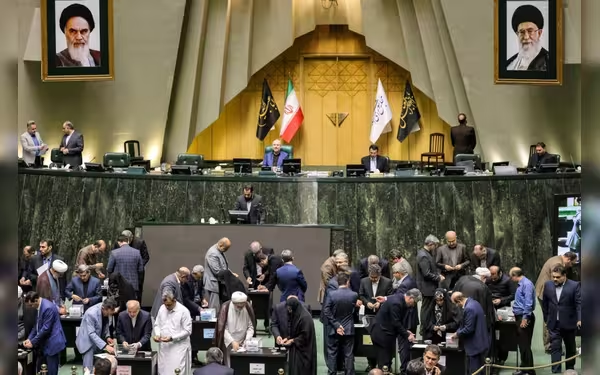Saturday, November 16, 2024 03:21 PM
Iran Parliament Rejects Sunni Vice President Appointment
- Iran blocks Sunni politician's vice presidency.
- Minority rights remain a significant issue in Iran.
- Hosseinzadeh advocates for Sunni representation.
 Image Credits: arabnewspk
Image Credits: arabnewspkIran's parliament blocks the appointment of Sunni politician Abdolkarim Hosseinzadeh, highlighting ongoing minority rights issues.
In a significant political development, the Iranian parliament has recently blocked the appointment of a Sunni politician to the vice president position. This decision highlights the ongoing challenges faced by minority groups in Iran, particularly the Sunni Muslim community, which constitutes about 10 percent of the country's population. The majority of Iranians are Shiite Muslims, and Shiism is recognized as the official state religion.
President Masoud Pezeshkian had proposed Abdolkarim Hosseinzadeh for the role of vice president for rural development and disadvantaged areas, citing his "valuable experience" in public service. However, on Wednesday, lawmakers voted against his resignation from parliament, which was necessary for him to assume the vice presidency. The official IRNA news agency reported that the vote resulted in 107 members in favor, 129 against, and five abstentions out of the 247 representatives present.
The political landscape in Iran has historically marginalized Sunni Muslims, especially since the Islamic revolution in 1979. Key positions of power have rarely been held by members of this minority group, which raises questions about representation and inclusivity in the Iranian government. Hosseinzadeh, a 44-year-old reformist, has been a vocal advocate for the rights of Sunnis in Iran. He has served as a representative for the northwestern cities of Naghadeh and Oshnavieh in the Iranian parliament since 2012.
During his election campaign, President Pezeshkian himself criticized the lack of representation for ethnic and religious minorities, particularly Sunni Kurds, in significant governmental roles. This situation underscores a broader issue of minority rights in Iran, where the political system often overlooks the voices of those who do not belong to the dominant Shiite majority.
The rejection of Hosseinzadeh's appointment serves as a reminder of the ongoing struggle for equality and representation faced by minority groups in Iran. As the country continues to navigate its complex political landscape, the voices of all its citizens, regardless of their religious or ethnic backgrounds, must be heard and valued. The future of Iran's governance may depend on its ability to embrace diversity and foster an inclusive environment for all its people.













